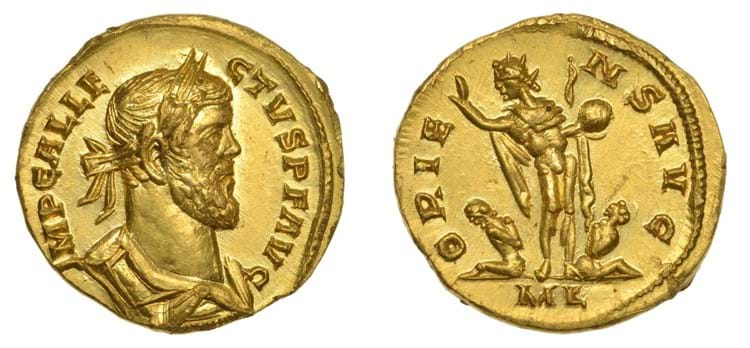The gold aureus dating from the brief reign of Allectus (AD293-296) is one of only 24 similar coins known from the period.
The 30-year-old metal detectorist, who has had the hobby for seven years, wishes to remain anonymous but explains: “I had permission to be on the land [a newly ploughed field close to a Roman road near Dover] by the owner – at first we found bits of old tractors and shotgun cartridges, but after 45 minutes I found the coin. I initially thought it was a half sovereign, but I gently sprayed it and it started to gleam.”
"First Allectus gold coin found in more than 50 years"
He continued: “I contacted the British Museum, who asked me to take it to show to their expert, Dr Sam Moorhead. He was able to confirm that the coin matches another in the British Museum collection [found at Silchester in the 19th century]. It appears to be the first Allectus gold coin found in more than 50 years.”
The coin - to be sold by London medal and numismatic specialist Dix Noonan Webb on June 5 - is the first to be offered at auction. As Christopher Webb, head of the coin department at DNW commented: “This is a unique opportunity to acquire a stunning and extremely rare Aureus. It has the original colour and only a few tiny marks.”
There are only 24 aurei of Allectus known with a total of 19 different obverse dies recorded. Many depict the war galleys that were key to his brief rise to power in Britannia.
Little is known about Allectus (his name in Latin translates simply as chosen or elected) but he was treasurer to Carausius, an officer in the Roman navy who seized power in Britain and northern Gaul in 283. Allectus celebrated the new ‘independence’ of Britain by assassinating Carausius and assumed command himself, governing a rebel empire through two fleets controlling the English Channel and the North Sea. Constantius launched an invasion to depose him in September 296 that left Allectus dead on a battlefield, probably at Silchester.
It is thought the coinage minted by Allectus was demonetised and melted down after his death, as none have been found in later hoards.






